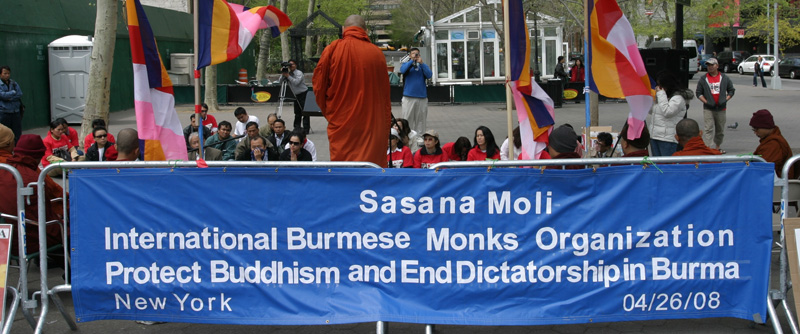Kovida dyed his newly-budding hair blond, stripped off his saffron robes and climbed over a brick wall. Carrying a false identification card and wearing a crucifix around his neck, he made his way toward the Thai border. For two weeks he hid in a tiny abandoned wooden hut in a small village 40 miles outside of Yangon. There was no running water, and little food. He was afraid to make any noise. Finally he left, running out barefoot in the middle of the night, diving into bushes and ditches whenever a car passed. By the time the October 18 edition of “The New Light of Myanmar” had falsely accused him of hiding “48 yellowish high-explosive TNT cartridges” in his monastery, Kovida was already in Thailand. He soon applied for asylum in the United States.
Stories of the Generation of ‘88
About 50,000 Burmese live in the United States, 2,000 of them in Elmhurst, a downtrodden neighborhood full of middle and working class immigrant families. Some Burmese here are families with children, looking for education; others are adults looking for work. But many are refugees, who simply don’t look back. And the monks who live in Elmhurst say they have no intention of returning soon.
The Elmurst Burmese community began forming after the last big spurt of anti-junta protests, in 1988, and the cancelation of a 1990 parliamentary election won by the party of democracy activist Aung San Suu Kyi, who remains under house arrest. U Aggadhamma, an activist of the Generation of ’88, has a story to tell from that time.
The barefoot monks filed inside, to their acetic main room, with its single couch and big oriental rug. They pulled their white folding chairs into a circle and prepared to talk.
U Aggadhamma sat very still, lips pursed, looking nervous at the prospect of sharing his story. He hesitated, looking around the circle of his fellow monks. Spiritual Director U Pannya Vamsa nodded in encouragement, and said, in a low, hypnotically calm om of a voice: “She wants the truth.”
Shortly after the ’88 protests, U Aggadhamma said, he was sentenced to five years in jail. His crime was refusing alms from government officials—a thousand-year-old tradition specifying that monks may refuse aid from those they want to rebuke for breaking Buddha’s laws.
In prison, Aggadhamma was stripped naked, and forced to lie on the cold cement floor of the cell. His jailers tortured and beat him when he would not answer their questions. After five years, “I completed my suffering,” he said, and was released. He resumed wearing his saffron robe, and agitating against the regime, though he likely would have been punished had he been caught. Then in 2000, he won the green card lottery, and with it the right to live in the United States.
“He was a lucky monk,” U Nayaka, his translator, teased.
U Aggadhamma didn’t smile. He gazed at the wall, an absent look in his eyes. His chair was closest to a string of lights hanging over a 35-pound white pearl statue of Buddha carried from India, displayed on a shelf of the faux-wood bookcase. For a moment, the flashes of green, red, and yellow lights seemed to make his orange-red robe shine the brightest.
Most of the monks live in monasteries, but the organization keeps a small staff a headquarters. Every morning at 5, they rise and pray to the white pearl Buddha in a corner. “We don’t pray to the statue, but see it and our mind goes to Buddha,” explained U Khemissara, a youthful monk nicknamed “The Monk Star.” He got this nickname because, before he became a monk, he was the hottest rock musician in Burmese Elmhurst.
“Hard rock,” he specified.
U Khemissara came to New York at 17, and attended Cardozo High School in Bayside, one of New York City’s best public high schools. He became lead guitarist of Mahura (Black Stone), which performed for the Burmese community. The group’s most popular song was “Breaking the Law.” But in 2006 he found a new calling: he returned to Burma, and joined the monkhood.
“The junta tried to make it seem like I came to Burma to cause trouble and stir the people,” he said shaking his head.
By the time he’d returned to New York in May 2007, he’d shaved off his shoulder-length rocker hair. But he is still a kind of lead vocal, with a hard voice. He organized and led the protest in front of the Burmese consulate in New York in September 2007, urging compassion for the monks, nuns, and people he’d left behind in Burma three months before. He roared on behalf of those suffering from poverty, hunger and health problems.
“They have no voice,” U Pannya Vamsa said in a choked outburst. “They have no voice.”

